Ethics Report: Moxie, Instagram, and Financial Institutions Analysis
VerifiedAdded on 2022/10/12
|6
|1405
|11
Report
AI Summary
This report delves into ethical considerations across different scenarios. It begins with an analysis of Moxie Marlinspike's decision to reject a request from a telecom company, examining the ethical implications of his actions and how the context of the request might alter his response. The report then assesses the ethicality of Instagram's decisions regarding user data and privacy policies, considering the drivers behind such policies and their impact. Finally, the report explores the ethical requirements outlined in Section 326 of the US Treasury's guidelines for financial institutions, focusing on customer identification and monitoring, and offers a personal perspective on these practices. The report emphasizes the importance of ethical behavior in the technology and financial sectors, highlighting potential conflicts of interest and the need for transparency and accountability.
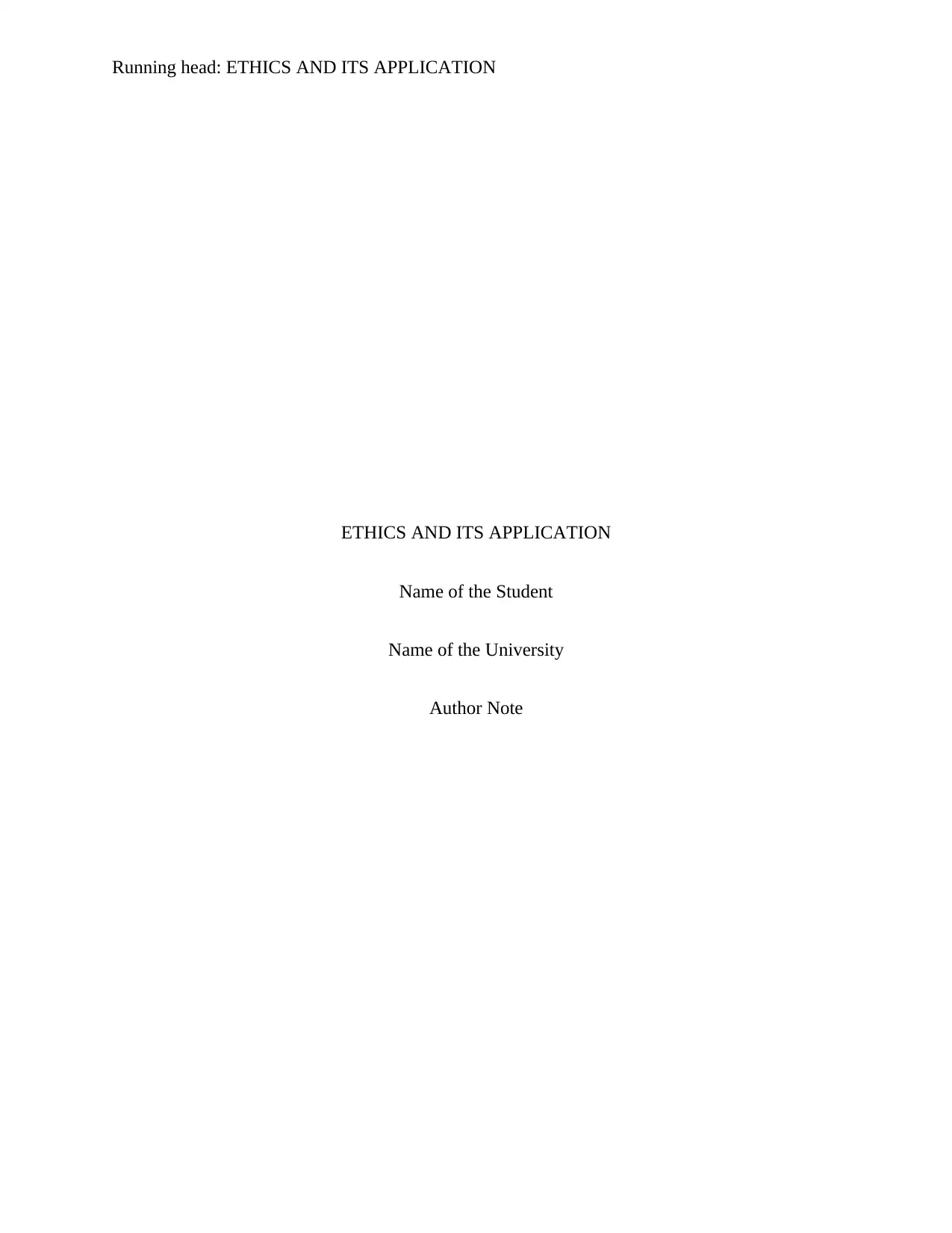
Running head: ETHICS AND ITS APPLICATION
ETHICS AND ITS APPLICATION
Name of the Student
Name of the University
Author Note
ETHICS AND ITS APPLICATION
Name of the Student
Name of the University
Author Note
Paraphrase This Document
Need a fresh take? Get an instant paraphrase of this document with our AI Paraphraser
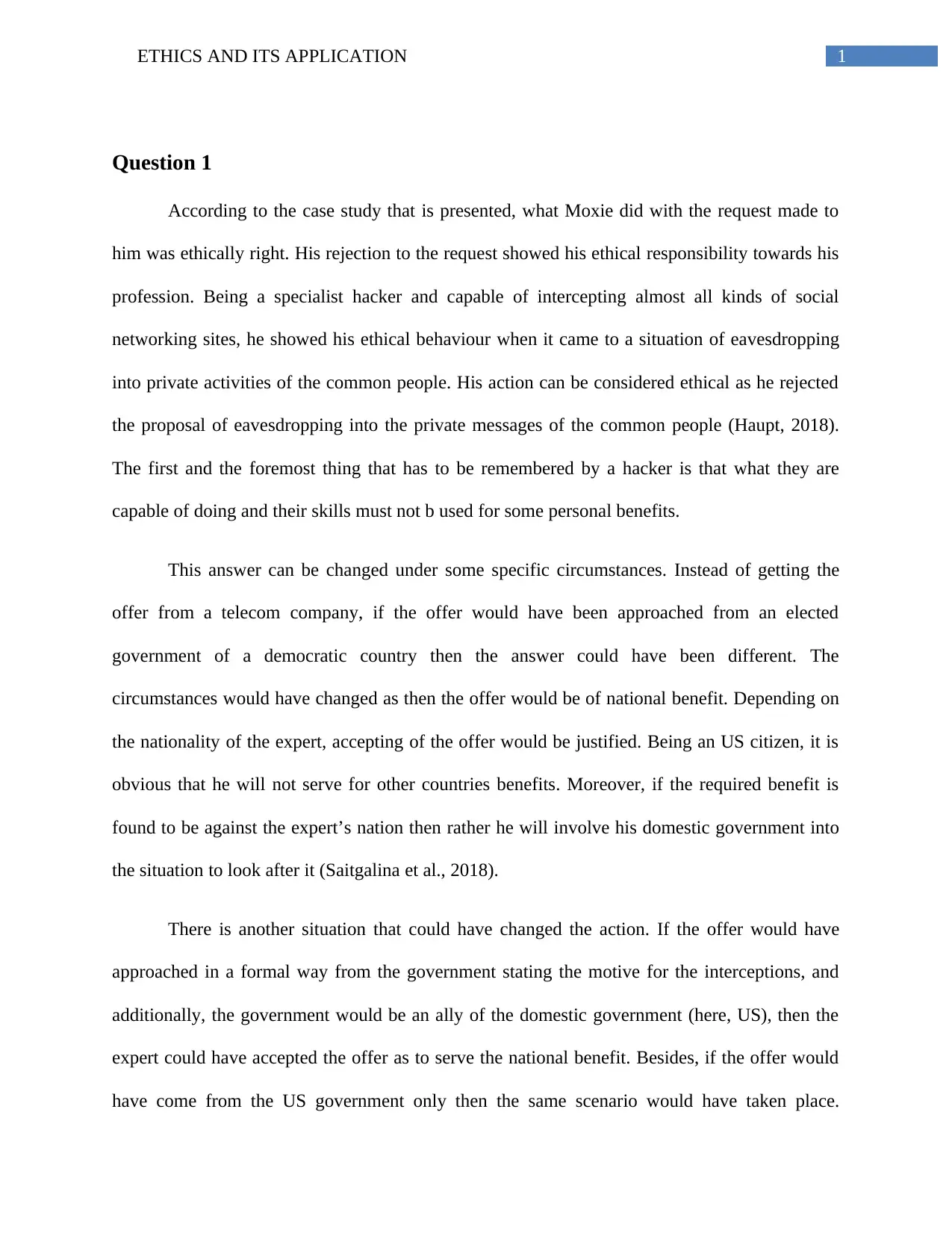
1ETHICS AND ITS APPLICATION
Question 1
According to the case study that is presented, what Moxie did with the request made to
him was ethically right. His rejection to the request showed his ethical responsibility towards his
profession. Being a specialist hacker and capable of intercepting almost all kinds of social
networking sites, he showed his ethical behaviour when it came to a situation of eavesdropping
into private activities of the common people. His action can be considered ethical as he rejected
the proposal of eavesdropping into the private messages of the common people (Haupt, 2018).
The first and the foremost thing that has to be remembered by a hacker is that what they are
capable of doing and their skills must not b used for some personal benefits.
This answer can be changed under some specific circumstances. Instead of getting the
offer from a telecom company, if the offer would have been approached from an elected
government of a democratic country then the answer could have been different. The
circumstances would have changed as then the offer would be of national benefit. Depending on
the nationality of the expert, accepting of the offer would be justified. Being an US citizen, it is
obvious that he will not serve for other countries benefits. Moreover, if the required benefit is
found to be against the expert’s nation then rather he will involve his domestic government into
the situation to look after it (Saitgalina et al., 2018).
There is another situation that could have changed the action. If the offer would have
approached in a formal way from the government stating the motive for the interceptions, and
additionally, the government would be an ally of the domestic government (here, US), then the
expert could have accepted the offer as to serve the national benefit. Besides, if the offer would
have come from the US government only then the same scenario would have taken place.
Question 1
According to the case study that is presented, what Moxie did with the request made to
him was ethically right. His rejection to the request showed his ethical responsibility towards his
profession. Being a specialist hacker and capable of intercepting almost all kinds of social
networking sites, he showed his ethical behaviour when it came to a situation of eavesdropping
into private activities of the common people. His action can be considered ethical as he rejected
the proposal of eavesdropping into the private messages of the common people (Haupt, 2018).
The first and the foremost thing that has to be remembered by a hacker is that what they are
capable of doing and their skills must not b used for some personal benefits.
This answer can be changed under some specific circumstances. Instead of getting the
offer from a telecom company, if the offer would have been approached from an elected
government of a democratic country then the answer could have been different. The
circumstances would have changed as then the offer would be of national benefit. Depending on
the nationality of the expert, accepting of the offer would be justified. Being an US citizen, it is
obvious that he will not serve for other countries benefits. Moreover, if the required benefit is
found to be against the expert’s nation then rather he will involve his domestic government into
the situation to look after it (Saitgalina et al., 2018).
There is another situation that could have changed the action. If the offer would have
approached in a formal way from the government stating the motive for the interceptions, and
additionally, the government would be an ally of the domestic government (here, US), then the
expert could have accepted the offer as to serve the national benefit. Besides, if the offer would
have come from the US government only then the same scenario would have taken place.
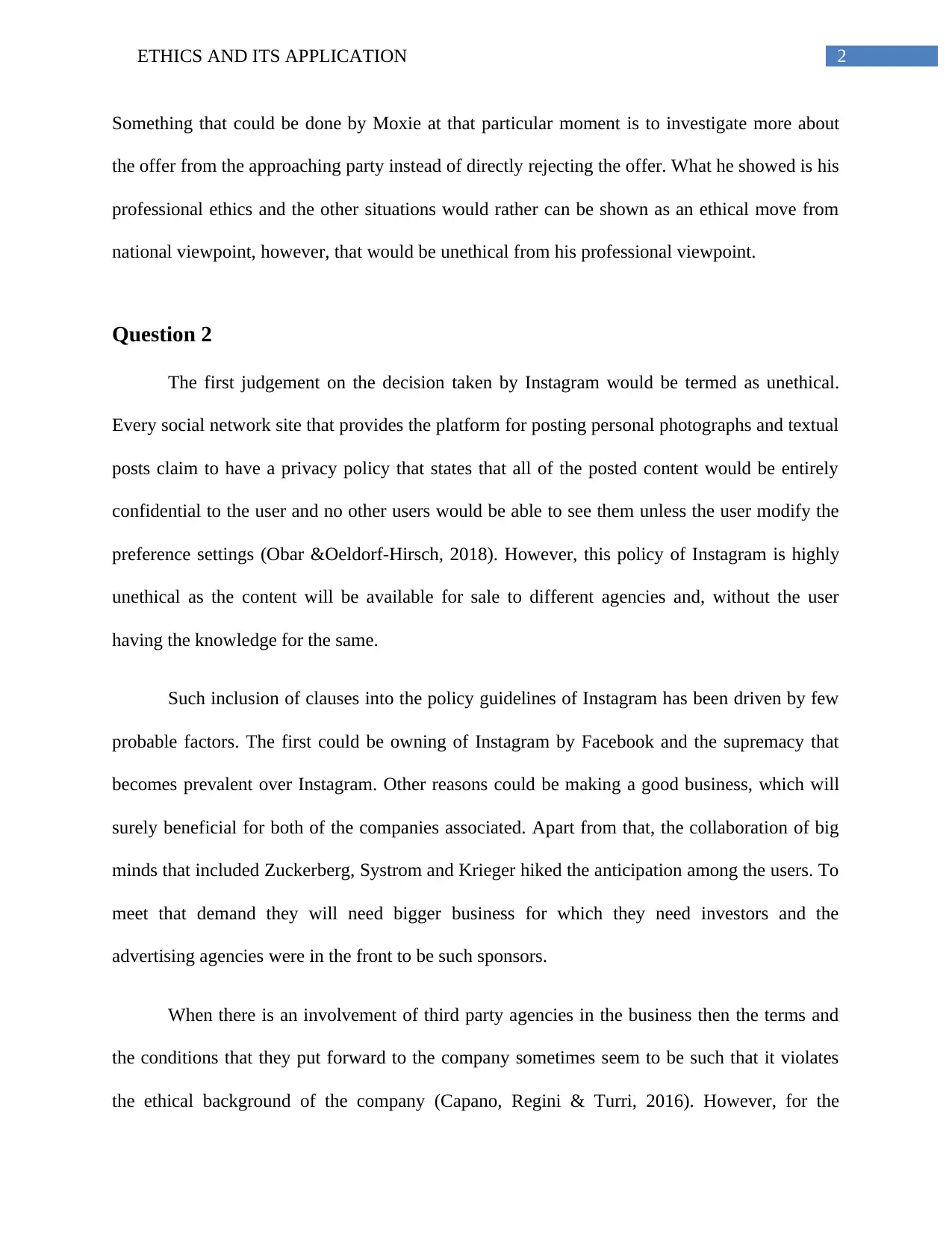
2ETHICS AND ITS APPLICATION
Something that could be done by Moxie at that particular moment is to investigate more about
the offer from the approaching party instead of directly rejecting the offer. What he showed is his
professional ethics and the other situations would rather can be shown as an ethical move from
national viewpoint, however, that would be unethical from his professional viewpoint.
Question 2
The first judgement on the decision taken by Instagram would be termed as unethical.
Every social network site that provides the platform for posting personal photographs and textual
posts claim to have a privacy policy that states that all of the posted content would be entirely
confidential to the user and no other users would be able to see them unless the user modify the
preference settings (Obar &Oeldorf-Hirsch, 2018). However, this policy of Instagram is highly
unethical as the content will be available for sale to different agencies and, without the user
having the knowledge for the same.
Such inclusion of clauses into the policy guidelines of Instagram has been driven by few
probable factors. The first could be owning of Instagram by Facebook and the supremacy that
becomes prevalent over Instagram. Other reasons could be making a good business, which will
surely beneficial for both of the companies associated. Apart from that, the collaboration of big
minds that included Zuckerberg, Systrom and Krieger hiked the anticipation among the users. To
meet that demand they will need bigger business for which they need investors and the
advertising agencies were in the front to be such sponsors.
When there is an involvement of third party agencies in the business then the terms and
the conditions that they put forward to the company sometimes seem to be such that it violates
the ethical background of the company (Capano, Regini & Turri, 2016). However, for the
Something that could be done by Moxie at that particular moment is to investigate more about
the offer from the approaching party instead of directly rejecting the offer. What he showed is his
professional ethics and the other situations would rather can be shown as an ethical move from
national viewpoint, however, that would be unethical from his professional viewpoint.
Question 2
The first judgement on the decision taken by Instagram would be termed as unethical.
Every social network site that provides the platform for posting personal photographs and textual
posts claim to have a privacy policy that states that all of the posted content would be entirely
confidential to the user and no other users would be able to see them unless the user modify the
preference settings (Obar &Oeldorf-Hirsch, 2018). However, this policy of Instagram is highly
unethical as the content will be available for sale to different agencies and, without the user
having the knowledge for the same.
Such inclusion of clauses into the policy guidelines of Instagram has been driven by few
probable factors. The first could be owning of Instagram by Facebook and the supremacy that
becomes prevalent over Instagram. Other reasons could be making a good business, which will
surely beneficial for both of the companies associated. Apart from that, the collaboration of big
minds that included Zuckerberg, Systrom and Krieger hiked the anticipation among the users. To
meet that demand they will need bigger business for which they need investors and the
advertising agencies were in the front to be such sponsors.
When there is an involvement of third party agencies in the business then the terms and
the conditions that they put forward to the company sometimes seem to be such that it violates
the ethical background of the company (Capano, Regini & Turri, 2016). However, for the
⊘ This is a preview!⊘
Do you want full access?
Subscribe today to unlock all pages.

Trusted by 1+ million students worldwide
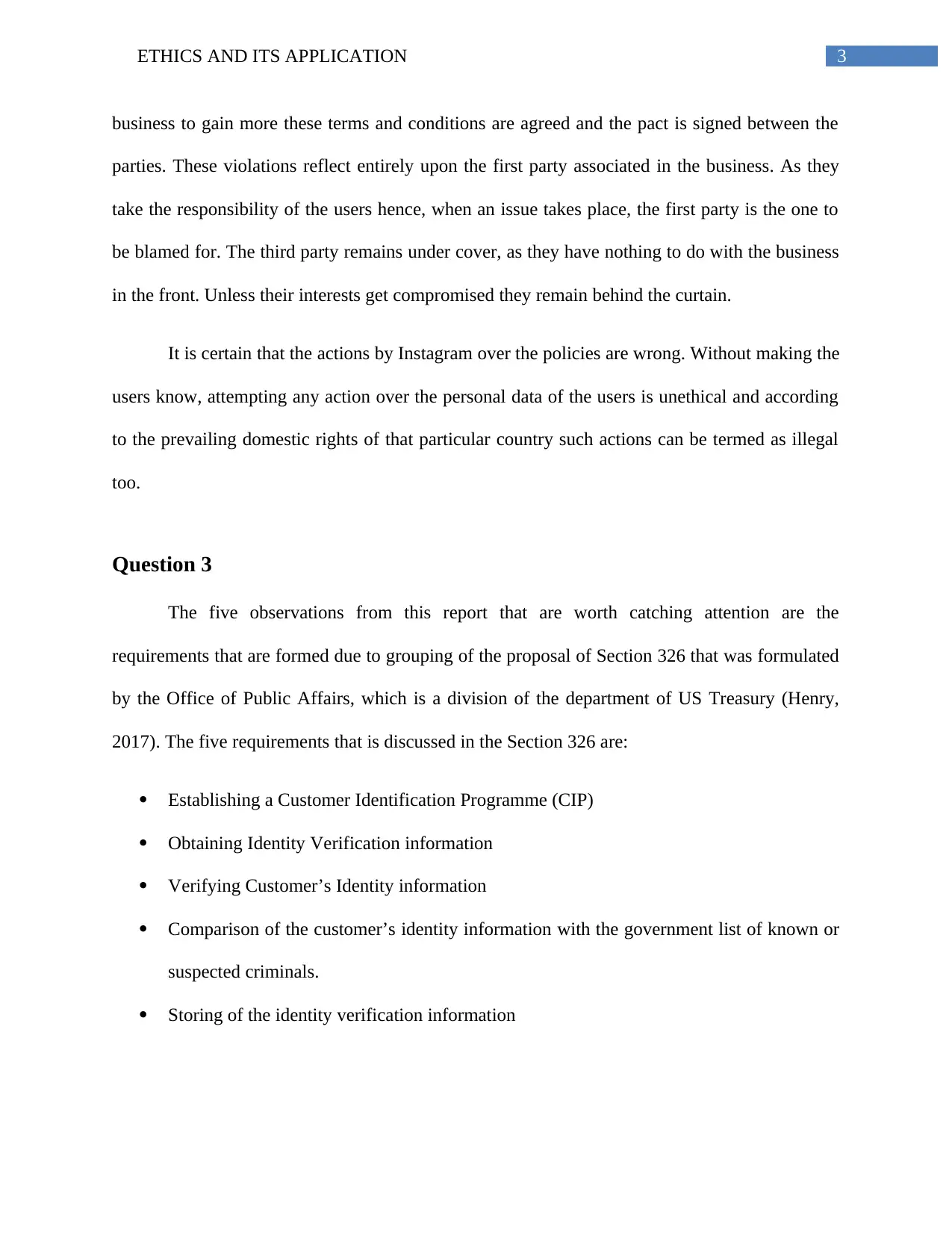
3ETHICS AND ITS APPLICATION
business to gain more these terms and conditions are agreed and the pact is signed between the
parties. These violations reflect entirely upon the first party associated in the business. As they
take the responsibility of the users hence, when an issue takes place, the first party is the one to
be blamed for. The third party remains under cover, as they have nothing to do with the business
in the front. Unless their interests get compromised they remain behind the curtain.
It is certain that the actions by Instagram over the policies are wrong. Without making the
users know, attempting any action over the personal data of the users is unethical and according
to the prevailing domestic rights of that particular country such actions can be termed as illegal
too.
Question 3
The five observations from this report that are worth catching attention are the
requirements that are formed due to grouping of the proposal of Section 326 that was formulated
by the Office of Public Affairs, which is a division of the department of US Treasury (Henry,
2017). The five requirements that is discussed in the Section 326 are:
Establishing a Customer Identification Programme (CIP)
Obtaining Identity Verification information
Verifying Customer’s Identity information
Comparison of the customer’s identity information with the government list of known or
suspected criminals.
Storing of the identity verification information
business to gain more these terms and conditions are agreed and the pact is signed between the
parties. These violations reflect entirely upon the first party associated in the business. As they
take the responsibility of the users hence, when an issue takes place, the first party is the one to
be blamed for. The third party remains under cover, as they have nothing to do with the business
in the front. Unless their interests get compromised they remain behind the curtain.
It is certain that the actions by Instagram over the policies are wrong. Without making the
users know, attempting any action over the personal data of the users is unethical and according
to the prevailing domestic rights of that particular country such actions can be termed as illegal
too.
Question 3
The five observations from this report that are worth catching attention are the
requirements that are formed due to grouping of the proposal of Section 326 that was formulated
by the Office of Public Affairs, which is a division of the department of US Treasury (Henry,
2017). The five requirements that is discussed in the Section 326 are:
Establishing a Customer Identification Programme (CIP)
Obtaining Identity Verification information
Verifying Customer’s Identity information
Comparison of the customer’s identity information with the government list of known or
suspected criminals.
Storing of the identity verification information
Paraphrase This Document
Need a fresh take? Get an instant paraphrase of this document with our AI Paraphraser
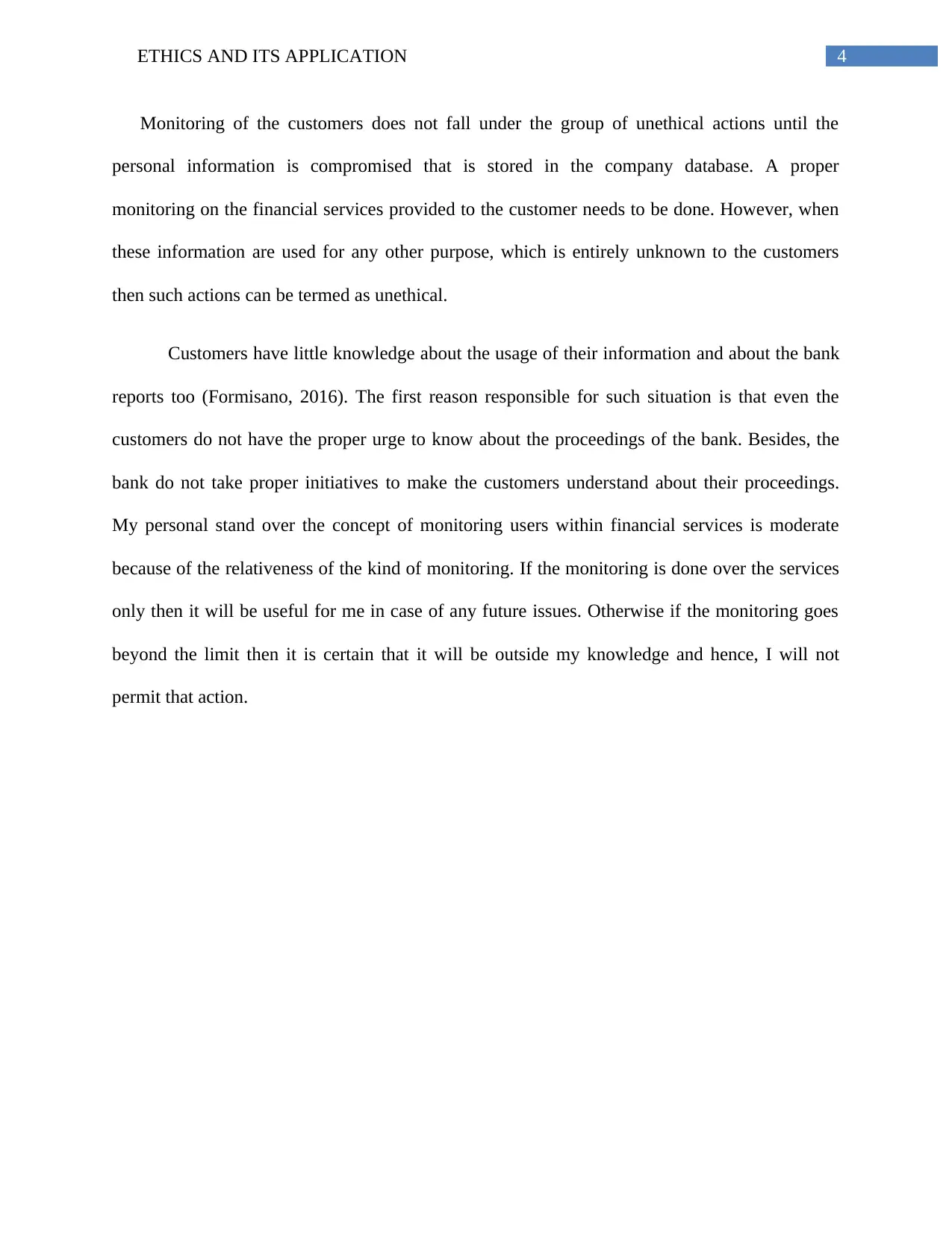
4ETHICS AND ITS APPLICATION
Monitoring of the customers does not fall under the group of unethical actions until the
personal information is compromised that is stored in the company database. A proper
monitoring on the financial services provided to the customer needs to be done. However, when
these information are used for any other purpose, which is entirely unknown to the customers
then such actions can be termed as unethical.
Customers have little knowledge about the usage of their information and about the bank
reports too (Formisano, 2016). The first reason responsible for such situation is that even the
customers do not have the proper urge to know about the proceedings of the bank. Besides, the
bank do not take proper initiatives to make the customers understand about their proceedings.
My personal stand over the concept of monitoring users within financial services is moderate
because of the relativeness of the kind of monitoring. If the monitoring is done over the services
only then it will be useful for me in case of any future issues. Otherwise if the monitoring goes
beyond the limit then it is certain that it will be outside my knowledge and hence, I will not
permit that action.
Monitoring of the customers does not fall under the group of unethical actions until the
personal information is compromised that is stored in the company database. A proper
monitoring on the financial services provided to the customer needs to be done. However, when
these information are used for any other purpose, which is entirely unknown to the customers
then such actions can be termed as unethical.
Customers have little knowledge about the usage of their information and about the bank
reports too (Formisano, 2016). The first reason responsible for such situation is that even the
customers do not have the proper urge to know about the proceedings of the bank. Besides, the
bank do not take proper initiatives to make the customers understand about their proceedings.
My personal stand over the concept of monitoring users within financial services is moderate
because of the relativeness of the kind of monitoring. If the monitoring is done over the services
only then it will be useful for me in case of any future issues. Otherwise if the monitoring goes
beyond the limit then it is certain that it will be outside my knowledge and hence, I will not
permit that action.
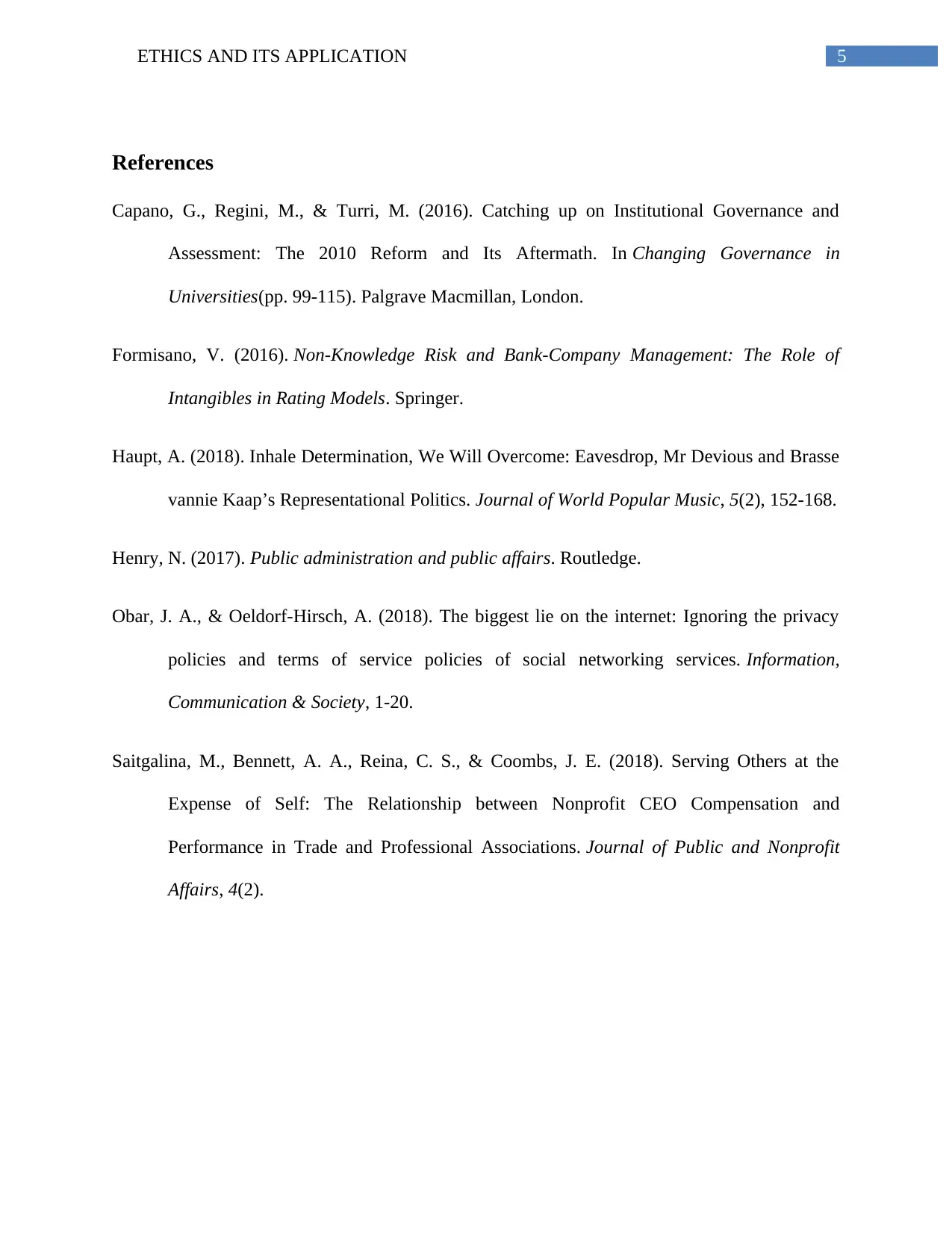
5ETHICS AND ITS APPLICATION
References
Capano, G., Regini, M., & Turri, M. (2016). Catching up on Institutional Governance and
Assessment: The 2010 Reform and Its Aftermath. In Changing Governance in
Universities(pp. 99-115). Palgrave Macmillan, London.
Formisano, V. (2016). Non-Knowledge Risk and Bank-Company Management: The Role of
Intangibles in Rating Models. Springer.
Haupt, A. (2018). Inhale Determination, We Will Overcome: Eavesdrop, Mr Devious and Brasse
vannie Kaap’s Representational Politics. Journal of World Popular Music, 5(2), 152-168.
Henry, N. (2017). Public administration and public affairs. Routledge.
Obar, J. A., & Oeldorf-Hirsch, A. (2018). The biggest lie on the internet: Ignoring the privacy
policies and terms of service policies of social networking services. Information,
Communication & Society, 1-20.
Saitgalina, M., Bennett, A. A., Reina, C. S., & Coombs, J. E. (2018). Serving Others at the
Expense of Self: The Relationship between Nonprofit CEO Compensation and
Performance in Trade and Professional Associations. Journal of Public and Nonprofit
Affairs, 4(2).
References
Capano, G., Regini, M., & Turri, M. (2016). Catching up on Institutional Governance and
Assessment: The 2010 Reform and Its Aftermath. In Changing Governance in
Universities(pp. 99-115). Palgrave Macmillan, London.
Formisano, V. (2016). Non-Knowledge Risk and Bank-Company Management: The Role of
Intangibles in Rating Models. Springer.
Haupt, A. (2018). Inhale Determination, We Will Overcome: Eavesdrop, Mr Devious and Brasse
vannie Kaap’s Representational Politics. Journal of World Popular Music, 5(2), 152-168.
Henry, N. (2017). Public administration and public affairs. Routledge.
Obar, J. A., & Oeldorf-Hirsch, A. (2018). The biggest lie on the internet: Ignoring the privacy
policies and terms of service policies of social networking services. Information,
Communication & Society, 1-20.
Saitgalina, M., Bennett, A. A., Reina, C. S., & Coombs, J. E. (2018). Serving Others at the
Expense of Self: The Relationship between Nonprofit CEO Compensation and
Performance in Trade and Professional Associations. Journal of Public and Nonprofit
Affairs, 4(2).
⊘ This is a preview!⊘
Do you want full access?
Subscribe today to unlock all pages.

Trusted by 1+ million students worldwide
1 out of 6
Related Documents
Your All-in-One AI-Powered Toolkit for Academic Success.
+13062052269
info@desklib.com
Available 24*7 on WhatsApp / Email
![[object Object]](/_next/static/media/star-bottom.7253800d.svg)
Unlock your academic potential
Copyright © 2020–2025 A2Z Services. All Rights Reserved. Developed and managed by ZUCOL.





